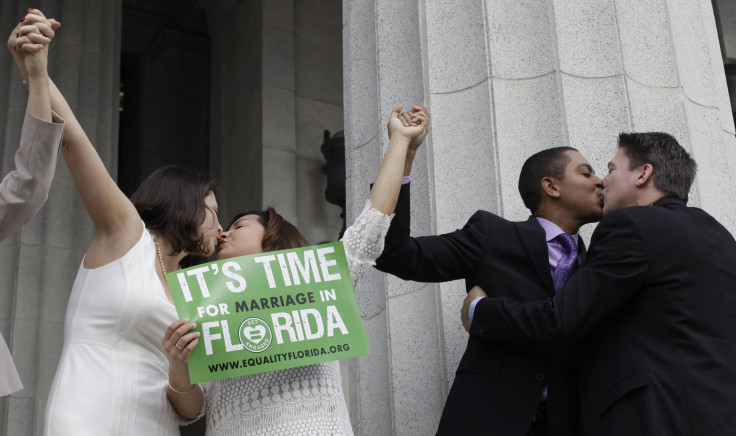Gay Marriage Map Shows Marriage Equality Falls Along Red, Blue Lines -- For Now

The U.S. Supreme Court announced Friday it will decide by June whether it’s up to the federal government or individual states to determine if same-sex marriage is constitutional. The decision will come after U.S. voters have undergone a remarkable shift in opinion, with polls consistently showing that support for marriage equality is growing. Widespread support isn’t reflected throughout the country, though, with traditionally conservative states still opposed to same-sex marriage.
The most recent state to legalize same-sex marriage was Florida when, on Jan. 6, it became the 36th state to grant more rights to gay and lesbian couples. South Carolina, Montana, Kansas and Missouri each walked away from same-sex marriage bans in November, with Massachusetts starting the wave of change in 2004. Of the 36 states that have legalized same-sex marriage, 25 did so by court decision, eight by state legislature and three by popular vote, according to GayMarriage.ProCon.org.
But same-sex marriage is still forbidden in Nebraska by constitutional amendment and 13 other states by both constitutional amendment and state law: Alabama, Arkansas, Georgia, Kentucky, Louisiana, Michigan, Mississippi, Missouri, North Dakota, Ohio, South Dakota, Tennessee and Texas.
Washington, D.C., also legalized gay marriage in March 2010. Marriage bans in seven of the 14 states where marriage equality is prohibited have been overturned, yet the change hasn’t been instituted because of either an appeal from the state attorney general or a delay from the judge who issued the ruling (and thus is expecting the state to appeal). Those states are Arkansas, Kentucky, Michigan, Mississippi, Missouri, South Dakota and Texas, where Judge Orlando Garcia wrote, “Without a rational relation to a legitimate governmental purpose, state-imposed inequality can find no refuges in our U.S. Constitution.”
All of that could change within the next six months, though, after the Supreme Court announced Friday that it will determine if the federal government has the power to legislate same-sex marriage. A number of political observers have suggested the court, which has a conservative majority on the bench, soon will overrule the states' ability to legislate who an individual marries.
“We’ve reached the moment of truth – the facts are clear, the arguments have been heard by dozens of courts, and now the nine justices of the Supreme Court have an urgent opportunity to guarantee fairness for countless families,” Chad Griffin, president of the Human Rights Campaign, the largest gay rights organization in the U.S., told USA Today.
© Copyright IBTimes 2024. All rights reserved.





















